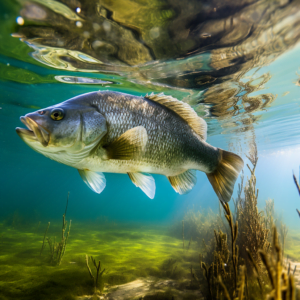Have you ever wondered if black bass is an oily fish? Well, you’re not alone. Many people are curious about the oily nature of black bass and its implications for our health and cooking. In this article, we’ll dive into the details and explore just how oily black bass really is and what that means for you.
Black bass, which includes species like largemouth bass and smallmouth bass, is indeed an oily fish. Unlike white fish such as cod or sole, black bass have a higher fat content, which contributes to their oily texture. This oiliness gives black bass a rich flavor and moist texture when cooked, making it a popular choice for many seafood lovers.
But what exactly does this mean for you in terms of health and cooking? Well, the oil in black bass is not only responsible for its delicious taste but also for its nutritional value. Oily fish like black bass are rich in omega-3 fatty acids, which have been shown to have numerous health benefits. These fatty acids can help reduce inflammation, lower blood pressure, and improve brain function, among other things.
So, whether you’re a fan of black bass for its flavor or its health benefits, there’s no denying the oily nature of this fish. In the article that follows, we’ll explore more about the nutritional value of black bass, its cooking methods, and some delicious recipes you can try to make the most of this flavorful and nutritious fish. So, stay tuned and get ready to learn more about the oily nature of black bass!
What is Black Bass?
Different species of Black Bass
Black bass refers to a group of fish species known for their dark coloration and aggressive behavior. The most common species of black bass include largemouth bass (Micropterus salmoides), smallmouth bass (Micropterus dolomieu), and spotted bass (Micropterus punctulatus). These species are found in freshwater bodies such as lakes, rivers, and reservoirs across North America.
Habitat and Behavior
Black bass are predominantly freshwater fish and are known to inhabit various aquatic environments. Largemouth bass are often found in shallow, weedy areas with ample coverage, such as submerged logs or vegetation, while smallmouth bass tend to prefer clearer water with rockier terrain. Spotted bass, on the other hand, exhibit a preference for deeper water habitats and are commonly found in reservoirs and large river systems.
Black bass are notorious for their voracious and opportunistic feeding behavior. They are carnivorous and primarily feed on smaller fish, crayfish, frogs, and insects. Their sharp teeth and strong jaws enable them to capture and consume their prey effectively.
The Oily Nature of Black Bass
Understanding oil content in fish
When discussing the oily nature of black bass, it is essential to understand the concept of oil content in fish. Oil content in fish relates to the amount of fat present in the flesh. Fish species categorized as oily fish generally have a higher fat content compared to lean fish.
Black Bass oil composition
Black bass, particularly largemouth bass and smallmouth bass, are considered moderately fatty fish. Their oil content ranges from 2-6%, although it may vary depending on various factors such as the fish’s age, diet, and environmental conditions.
The oil found in black bass flesh primarily consists of omega-3 fatty acids, which are essential for human health. Omega-3 fatty acids, specifically eicosapentaenoic acid (EPA) and docosahexaenoic acid (DHA), have been extensively studied for their potential health benefits.
Health benefits of oily fish
Consuming oily fish like black bass can provide numerous health benefits. The omega-3 fatty acids found in black bass have been shown to promote heart health by reducing the risk of cardiovascular diseases. They help lower blood pressure, reduce triglyceride levels, and prevent the formation of blood clots.
Omega-3 fatty acids also play a crucial role in brain development and function. They are essential for maintaining cognitive function, improving memory, and reducing the risk of neurodegenerative diseases such as Alzheimer’s and dementia.
Additionally, omega-3 fatty acids have anti-inflammatory properties, which help alleviate symptoms of chronic inflammatory conditions such as arthritis and autoimmune diseases.
Potential risks of consuming oily fish
While consuming black bass and other oily fish has numerous health benefits, it is essential to be aware of potential risks. One concern associated with consuming fish is the presence of environmental contaminants, such as mercury and polychlorinated biphenyls (PCBs).
Mercury is a naturally occurring toxic metal found in water bodies, and it can accumulate in the fatty tissues of fish over time. High levels of mercury consumption can be detrimental, especially for pregnant women, as it can harm the developing fetus’s nervous system.
To minimize the risk of mercury and PCB exposure, it is advisable to consume black bass and other fish species in moderation and choose smaller-sized fish, as they tend to accumulate lower levels of contaminants. Pregnant women, nursing mothers, and young children should follow specific guidelines provided by health authorities regarding fish consumption.
Cooking with Black Bass
Popular black bass recipes
Black bass is a versatile fish that can be prepared in various delicious ways. Some popular recipes include blackened bass, grilled bass with lemon and herbs, bass tacos, and pan-seared bass with a creamy sauce. These recipes allow the natural flavors of black bass to shine while adding a delightful twist to the dish.
Best cooking methods for black bass
When it comes to cooking black bass, various methods can be employed to enhance its taste and texture. Grilling and baking are popular techniques that allow the fish to retain its natural moisture while imparting a smoky flavor. Pan-searing is another method that achieves a crispy exterior while keeping the flesh tender and juicy.
Another technique to consider when cooking black bass is poaching. Poaching the fish in a flavorful broth helps to infuse the flesh with additional taste and keeps it moist.
Tips for enhancing flavor
To enhance the flavor of black bass, consider marinating the fish before cooking. A simple marinade consisting of olive oil, lemon juice, garlic, and herbs can add depth and enhance the fish’s natural taste.
Adding complementary ingredients such as citrus fruits, fresh herbs, and spices can also elevate the flavor profile of black bass. Pairing the fish with ingredients like lemon, dill, thyme, or paprika can provide a delightful balance of flavors.
The Taste Profile of Black Bass
Distinctive flavors of black bass
Black bass has a distinctive taste that is often described as sweet, mild, and earthy. The fish’s flavor profile can vary slightly depending on the species and the waters it inhabits. Largemouth bass tends to have a milder taste, while smallmouth bass has a slightly stronger flavor. Spotted bass often falls in between, offering a balance of flavors.
Pairing black bass with complementary ingredients
Black bass’s mild and versatile flavor makes it an excellent canvas for a wide range of complementary ingredients. As mentioned earlier, citrus fruits like lemon or lime can provide a refreshing zest that pairs well with the fish’s natural sweetness. Fresh herbs such as dill, thyme, or parsley can add an aromatic touch, enhancing the overall taste.
For a more robust flavor profile, black bass can be paired with spices like paprika, cayenne pepper, or blackened seasoning. These spices add depth and a pleasantly spicy kick to the dish.
Sustainable Fishing Practices
Impact of fishing on black bass populations
It is crucial to consider the sustainability of fishing practices to ensure the long-term viability of black bass populations. Overfishing, habitat destruction, and pollution can significantly impact black bass populations, threatening their survival and disrupting the delicate balance of aquatic ecosystems.
Sustainable fishing methods
To support the sustainability of black bass populations, responsible fishing practices should be implemented. Catch-and-release fishing is an effective strategy that allows anglers to enjoy the sport while minimizing the impact on fish populations. Catch-and-release practices ensure that fish are handled carefully and released unharmed back into the water.
Additionally, practicing proper fishing etiquette, such as obeying fishing regulations and using appropriate gear, can contribute to maintaining healthy black bass populations and preserving their habitats.
Supporting responsible fishing practices
Consumers can support responsible fishing practices by choosing fish from sustainable sources. Look for certifications from reputable organizations, such as the Marine Stewardship Council (MSC), that ensure the fish were caught using sustainable methods and in environmentally friendly ways.
Supporting local fisheries and purchasing fish locally can also contribute to sustainable fishing practices. Locally caught black bass reduces the carbon footprint associated with transportation and supports the local economy.
Choosing and Storing Black Bass
Selecting fresh black bass
When selecting black bass, there are a few indicators to look for to ensure its freshness. The flesh should appear firm and have a vibrant, glossy appearance. The eyes should be clear and not cloudy, indicating that the fish is relatively fresh.
Additionally, the fish should have a mild, oceanic smell, free from any strong fishy odors. This smell test can help determine if the fish has started to spoil.
Proper storage to maintain freshness
To maintain the freshness of black bass, it is essential to store it properly. The fish should be refrigerated promptly after purchase, ideally at temperatures below 40°F (4°C). To prevent cross-contamination, it is recommended to store the fish in a sealed container or wrap it tightly in plastic wrap or aluminum foil.
Fresh black bass can be stored in the refrigerator for up to two days. To prolong its shelf life, consider freezing the fish. Black bass can be frozen for up to three months without significantly affecting its taste and texture.
Nutritional Value of Black Bass
Rich source of protein and omega-3 fatty acids
Black bass offers a host of essential nutrients, making it a nutritious choice for a balanced diet. The fish is a rich source of high-quality protein, which is crucial for muscle growth, repair, and overall body function.
In addition to protein, black bass is also an excellent source of omega-3 fatty acids. These fatty acids are essential for optimal brain function, reducing inflammation, and promoting heart health.
Additional nutrients in black bass
In addition to protein and omega-3 fatty acids, black bass provides other essential vitamins and minerals. It is a good source of vitamins B6 and B12, which play a significant role in maintaining healthy nerve and blood cells. The fish also contains minerals such as selenium, phosphorus, and potassium, which contribute to various bodily functions.
Health Considerations
Omega-3 benefits for cardiovascular health
The omega-3 fatty acids found in black bass offer numerous benefits for cardiovascular health. Research has shown that regular consumption of omega-3 fatty acids can help reduce the risk of heart disease, lower blood pressure, and improve overall heart function.
Omega-3 fatty acids aid in reducing inflammation in blood vessels, preventing the buildup of plaque, and reducing the risk of blood clots. They also help to maintain normal heart rhythm and prevent abnormal heart rhythms that can lead to cardiac events.
Mercury levels in black bass
While black bass is a nutritious fish, there are concerns regarding the potential presence of mercury. Mercury is a naturally occurring element that can accumulate in the fatty tissues of fish. Large predatory fish, such as black bass, have a higher likelihood of containing higher mercury levels due to their position in the food chain.
To minimize mercury exposure, it is advisable to consume black bass in moderation and follow the guidelines provided by health authorities. Pregnant women, nursing mothers, and young children should be particularly cautious due to the potential harm mercury can cause to the developing nervous system.
Pregnancy and fish consumption
During pregnancy, women are often advised to consume fish due to their omega-3 fatty acid content, which is beneficial for fetal brain development. However, due to the potential presence of mercury, pregnant women should be cautious about the fish they consume.
While black bass can be enjoyed as part of a balanced diet, it is advisable for pregnant women to limit consumption to two servings per week and choose smaller-sized fish to reduce mercury exposure.
Black Bass as a Game Fish
Recreational fishing popularity
Black bass is one of the most sought-after game fish in North America, attracting recreational anglers due to its size, strength, and challenging nature. The thrill of catching a trophy-sized black bass draws both novice and experienced anglers to lakes and rivers in pursuit of this prized species.
Tactics for catching black bass
To increase the chances of hooking a black bass, anglers employ various fishing tactics and techniques. Popular methods for catching black bass include casting with artificial lures, using live bait such as minnows or worms, or fly fishing with specialized bass flies.
Anglers often target specific areas where black bass are known to congregate, such as submerged structures, weed beds, or shoreline cover. Techniques such as flipping and pitching, which involve precise casting and presentation, are commonly used in these areas to entice strikes from black bass.
Conclusion
In conclusion, black bass is indeed an oily fish. Its moderate oil content, rich in omega-3 fatty acids, contributes to its distinctive taste and numerous health benefits. Consuming black bass can support cardiovascular health, promote brain function, and provide essential nutrients. However, it is essential to be mindful of potential risks associated with environmental contaminants, particularly mercury.
Cooking with black bass offers endless possibilities, whether grilling, baking, or poaching. Pairing black bass with complementary ingredients further enhances its flavor profile, making it a delight to the palate. Sustainable fishing practices and responsible consumption of black bass can ensure the preservation of this iconic game fish and the vitality of its habitats.




